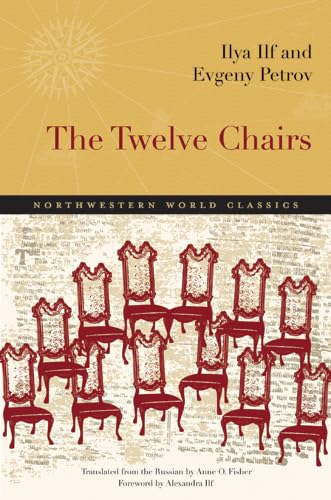

The Twelve Chairs: A Novel (Northwestern World Classics)
D**R
The OSTAP Overview
Well ... here's the thing. For reasons I won't go into here, I've had occasion to own and read ALL the English translations extant of both THE TWELVE CHAIRS and its sortakinda "sequel" THE (LITTLE) GOLDEN CALF. (The discrepancy in the title of the second is due to a peculiarity of Russian, which lets you make a diminution of calf without quite saying little calf; it's a construction, not an adjective, and there's no English equivalent. But it's similar to Yiddish, in which the name David, which translates as Duvid, can be turned into Duvidl [DOO-vid-ul] both as an endearment or as a nickname for a youngster.)Anyway, having read them all, carefully, comparatively and cover-to-cover, I can say this with absolute assurance: no matter which you read, if you're reading solely for pleasure, you'll get an accurate representation of the book. To be sure, each iteration carries its translator's/translators' imprimatur, but all are similar of tone and content (notwithstanding that some of the early translations are not quite as complete, which matters more academically than aesthetically). None is perfect, but none shortchanges you.In making consumer comparisons, one should probably dispense with the first version of THE TWELVE CHAIRS (published as DIAMONDS TO SIT ON) by Elizabeth Hill and Doris Mudie, and the first of THE LITTLE GOLDEN CALF (under that title) by Charles Malamuth, both from the 1930s, long out of print and likely never to be reissued. Which leaves John C. Richardson's versions of both THE TWELVE CHAIRS (still in print and available as a free download at one of the open library sites, having apparently slipped into the public domain) and THE GOLDEN CALF (under that title), which is out of print but "gettable" via antiquarian sites, in paperback and (sometimes expensively) in an omnibus edition with CHAIRS, called THE COMPLETE ADVENTURES OF OSTAP BENDER. And of course the new translations: THE GOLDEN CALF by Konstantin Gurevich & Helen Anderson, THE LITTLE GOLDEN CALF by Anne O. Fisher, and Ms. Fisher's even newer version of THE TWELVE CHAIRS.For the smoothness of the read, and the best delivery of natural-sounding, idiomatic English, Richardson is a little subdued (perhaps because he's British, and too because his work reflects his era, the 1960s) but sturdy, dependable and above all entertaining. Reading either book -- again, if pleasure or expanding your world literature horizon is the goal -- you can't go wrong.However, his is not the liveliest, most energetic job of prose and dialogue; that honor goes to Gurevich-Anderson's THE GOLDEN CALF (2009). But comparing their version to others, it would seem less accurate to the letter of the text than the spirit of the text (but not so interpretive that it distorts). There's a conscious effort here to eschew all vestiges of archaicism and make the prose sound not updated but contemporary.Anne Fisher's versions of THE TWELVE CHAIRS (2011) and THE LITTLE GOLDEN CALF (2009) would seem to be the most academically accurate, but the trade-off is that they're not consistently *as* entertaining, and sometimes sacrifice liveliness on the altar of literalness. But the entirely worthwhile trade-off, to those for whom such is important -- and it was for me -- is that her books trump the others easily for scholarship. Introductory essays, appendices of detailed footnotes, in CALF an extra appendix flagging some of the Ilf & Petrov phrases that entered everyday Russian speech, are rich and valuable sources of information and provide the widest possible context for a Western world reader.Don't be sucked in by any of the "translation smackdowns" you may find online or at Amazon regarding these titles. (i.e. while it's true that Ilf's daughter, Alexandra, authorized the Gurevich-Anderson translation of CALF, she nonetheless wrote her foreword for the Anne Fisher translation; and another for Fisher's CHAIRS.) No version is a bad choice. But knowing what each version has to offer should help you decide on the one(s) that you'll find most gratifying.
V**R
In Darkness, Humor
These guys were the Mark Twains or Kinky Friedmans of Soviet Russia. An entertaining and fun read with subtle hints at underlying darkness. It’s no wonder there are statues of Ostap Bender in Russia--he's a national hero.
J**T
Spectacular translation
I agree wholeheartedly with Pelaphus. Anne Fisher gives us the first and only worthwhile English translation of _The Twelve Chairs_, which is a must read for anyone wanting to understand Russian / Soviet culture. Better yet, you should also buy Fisher's translation of Ilf and Petrov's The Little Golden Calf . After that, you're set.
E**A
Very good service
My son from LA adores this book, thanks ! His mother
K**V
Best humor
How can it not? Great classic and by intelligent Soviet writer, best humour, fabulous characters, wonderful satire on timeless human flaws
A**R
nice price, good quality
Fast delivery, nice price, good quality.
A**A
Five Stars
I started reading it
H**S
Five Stars
Great!
R**N
top ten ever
This book is excellent. So many quotes laughs twists, it's great. The task of saving the drowning falls to the drowning themselves. lol the price of oats is so high :)
T**R
Perfect for a student of Russian
I got this as a Brit learning russian and was told it would give me a great insight into the culture..I started laughing in the first chapter. I now wish my russian was good enough to read in the original. I can't wait to read the sequel
B**U
Russian classic
If you want to understand Russian mentality which has not changed since time this book has been written, read this book.It is humorous, dynamic and very wise.
L**M
Great
Excellent book
H**B
Five Stars
One of my favourite books - timeless satire
Trustpilot
3 weeks ago
1 week ago